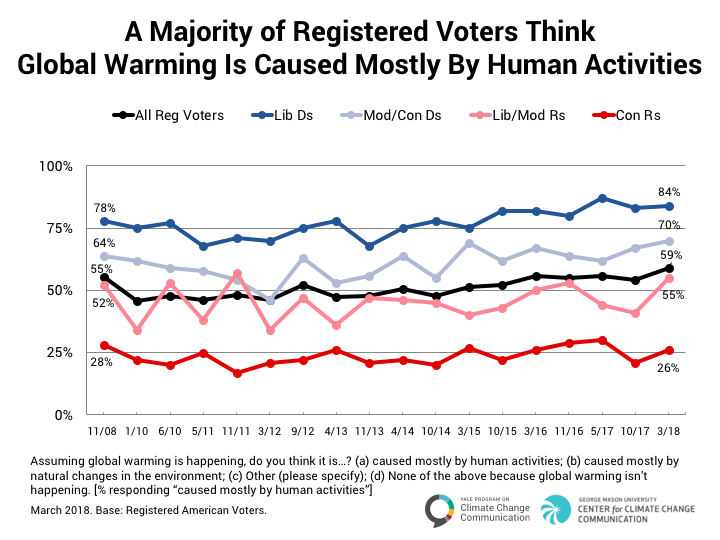12 September 2018
Talking health might shift attitudes on global warming
Posted by Shane Hanlon
By Shane M Hanlon
Global warming is a political issue. It shouldn’t be, but it is. I recently wrote a post about it that outlined political views on the subject, probably best summarized by this1:

Takeaway: majority of folks think that global warming is happening but views vary widely based on political affiliation. You might ask, “Yeah, but there are a bunch of different people in political parties. What about different levels of education?” Well2:

So, education over the course of years (generally) improves acceptance that climate change (recognizing that using the phrase “climate change” versus “global warming” should be taken into consideration) is happening now because of us. But can attitudes change over a shorter period of time with different framing? Short answer: yes.
In a recent study, How Americans respond to information about global warming’s health impacts: Evidence from a national survey experiment, researchers asked if folks exposed to information about different types of health impacts of global warming would shift their opinions on the issue. Before, and after, participants read eight short essays on the health impacts of global warming, they were asked:
- “On a scale from -5 (very bad) to +5 (very good), do you think global warming is bad or good for the health of people in your community?”
- “How certain (or uncertain) are you about your answer to the previous question regarding how bad or good you think global warming is for the health of people in your community?”
- “How important is the issue of global warming to you personally?”
- “How worried are you about global warming?”
- “How much do you think global warming will harm you personally?”
- “How much do you think global warming will harm future generations of people?”
- “[Should] the following entities should be doing more or less to protect people from health problems caused by global warming: The President; The U.S. Congress; Federal agencies; Your state government; Your local government?
The researchers also assessed participants’ political ideology and the presence of any chronic health conditions.
After reading the essays, participants overall revised their attitudes on how much global warming will/does affect health. Moderate- and somewhat conservative-leaning participants showed a larger attitude change than very/somewhat liberal- and very conservative-leaning participants. Additionally, those with a chronic condition showed a larger change in attitude.
Those who read the essays became more worried that global warming will cause more harm to them and future generations.
On the health front, participants cared more about illnesses from contaminated food and water, as well as from disease-carrying organisms, compared to other health effects such as extreme heat, poor air quality, and extreme weather events. Finally, participants became more certain in their knowledge after reading the essays.
The authors showed the importance of framing global warming as a public health issue. Through a single exposure to eight short essays on the health impacts of global warming, they were able to show that people across the political spectrum have the potential to change their views on the issue. This work that shows that communication around climate change should potentially include framing talk about global warming around health impacts.
–Shane M Hanlon is a Senior Specialist in AGU’s Sharing Science program. Find him on Twitter at @EcologyOfShane. This study has been accepted for publication in GeoHealth, an AGU journal.
—
1) Leiserowitz, A., Maibach, E., Roser-Renouf, C., Rosenthal, S., Cutler, M., & Kotcher, J. 2017. Politics & Global Warming, March 2018. Yale University and George Mason University. New Haven, CT: Yale Program on Climate Change Communication.
2) Hamilton, L.C., Bell, E., Hartter, J., & Salerno, J.D. 2018. A Change in the Wind? US Public Views on Renewable Energy and Climate Compared. Energy, Sustainability and Society 8(1): 11.


 The Plainspoken Scientist is the science communication blog of AGU’s Sharing Science program. With this blog, we wish to showcase creative and effective science communication via multiple mediums and modes.
The Plainspoken Scientist is the science communication blog of AGU’s Sharing Science program. With this blog, we wish to showcase creative and effective science communication via multiple mediums and modes.